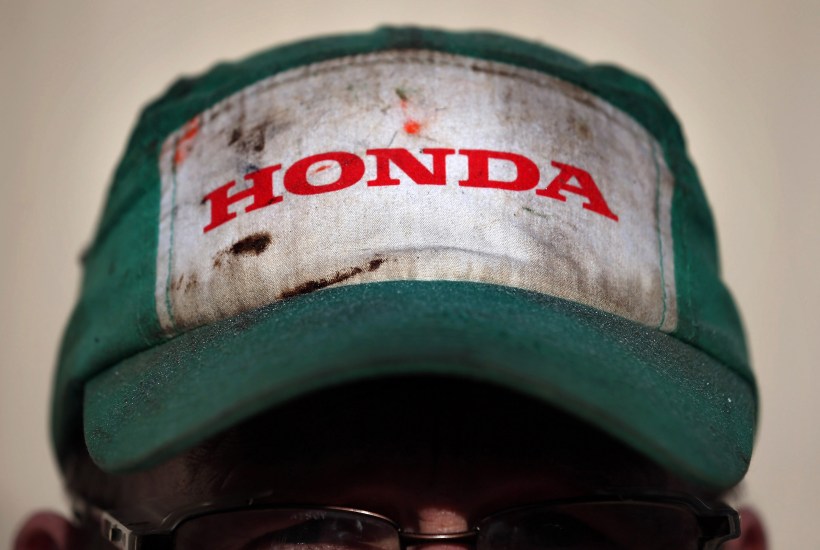When I wrote a fortnight ago, in the context of Nissan’s decision not to build its new X-Trail model at Sunderland, that ‘British carmaking as a whole is on course to shrink back to the 1970s’, I was expecting the next bulletin of doom from US-owned Ford, whose bosses — I’d heard from an insider — were ‘hair-on-fire apoplectic’ at the government’s failure to provide Brexit clarity. Subsequent indications that Ford may shift some production out of the UK were taken by industry watchers as a mild warning of serious cutbacks to come — but meanwhile, news of Honda’s factory closure at Swindon knocked everything else off the headlines.
Honda’s declared rationale was more about its global strategy for electric cars (another area in which our government has provided scant encouragement) and less about Brexit. But this is a hugely symbolic blow, because the great renaissance of the UK car industry began with Honda on Christmas Day 1979, when British Leyland boss Sir Michael Edwardes flew to Japan to sign a joint venture for the production of the Honda Acclaim in BL factories. The long-term fruit of that connection was the arrival of Nissan and Toyota and, though BL itself passed into history, the survival of its DNA in Jaguar Land Rover — the success story of the 2000s that has, like so much else in the industry, lately gone into reverse. Many other factories are now under threat and the Japanese in particular prefer to move as a pack: news from Toyota will surely be next.
How not to talk to Tokyo
It doesn’t help that Liam Fox and Jeremy Hunt are reported to have damaged prospects for a post-Brexit trade deal with Japan by sending a letter emphasising that they are committed to speed and flexibility ‘and hope Japan is too’. The Japanese, having apparently already formed a dim view of the British negotiating team, took this as ‘an accusation of foot-dragging’ (says the FT) and considered cancelling further talks.
It’s a pity our boys didn’t seek my advice. Long ago, I conducted an interminable series of meetings with the ministry of finance in Tokyo to obtain a securities dealing licence on behalf of Barclays, for whom I worked. ‘Not really a negotiation,’ I wrote later, ‘but a Kafkaesque game’ in which the ministry men — inheritors of the samurai in Japan’s feudal power structure — made up new rules whenever we came close to fulfilling known ones, holding us back until reciprocal gains had been won for Nomura and other Japanese firms then besieging the City of London. Our bête noir was an official called Fujitsuka whose civility to foreigners was ricepaper thin: when we tried to circumvent him via the Bank of England, he subjected my Japanese colleague, Mr Hirayama, to a savagely nationalistic dressing-down.
I also sent Hirayama to plead for a more co-operative response from contractors responsible for fitting out the building in which we were due to start trading a few months later. Again he was harangued and told to wait at the back of the queue, returning from the encounter to accuse me of acting like the officers who had ordered him, as a teenage conscript in Manchuria in the 1930s, into battle at the point of a gun.
Of course when it suited the purposes of what we used to call ‘Japan Inc’ — then widely feared as a rising global economic power — the licence was issued and the offices were perfectly finished. Grand opening ceremonies and expressions of friendship followed. But in hindsight the advantage was all theirs, secured by ruthless clarity of objectives and disciplined co-ordination between bureaucrats, business and politicians. Would that we had those attributes on our side of the table today.
Boeing not gone
Not all my gloomy predictions come to pass. Fifteen years ago I wrote an elegy here for the Boeing 747 Jumbo Jet, an aircraft that had ‘changed the world by making it smaller’ and on which I claimed to have clocked up air miles equivalent to a trip to the moon and halfway back. But its death knell had been sounded, I wrote, by the unveiling of the 555-seat double-decker Airbus A380, whose lower fuel burn, longer range and reduced emissions represented the future of intercontinental aviation.
Now the friendless A380, of which only 234 have been built, is heading for the scrapheap for lack of new orders, while the 747 — celebrating its 50th birthday this month, with 1,548 built — remains in production. When I spotted an A380 on the tarmac at Toulouse the other day, I thought: ‘What an ugly monster.’ When I spot a Jumbo, my heart beats a little faster. For once, I’m happy to be wrong.
No helipad for Jeff
My hopes of an invite from Jeff Bezos to the opening of Amazon’s proposed but now cancelled ‘HQ2’ at Long Island City in New York were slim, since I was thrown out of his existing Seattle HQ on the orders of the online giant’s PR police. But I disagree with rising-star Democrat congresswoman Alexandria Ocasio-Cortez, who hailed the scrapping of the project as a victory for ‘everyday New Yorkers’ over ‘Amazon’s corporate greed, its worker exploitation, and the power of the richest man in the world’.
It’s true that the way Amazon invited US cities to tender for the new complex with competing local tax breaks — while reportedly having paid no federal taxes on some $17 billion of profits for the past two years — displayed extreme corporate arrogance. The fact that the Long Island City site would have included a helipad for Bezos and his senior colleagues’ exclusive use was deemed particularly offensive. But still the pragmatic calculation was that New York would have gained 25,000 jobs and $27 billion in state and city tax revenues in return for $3 billion of ‘incentives’. It’s perverse of America’s increasingly strident left-wing ‘progressives’ to celebrate losing all that, even if it would have made Jeff richer than ever.
Got something to add? Join the discussion and comment below.
Get 10 issues for just $10
Subscribe to The Spectator Australia today for the next 10 magazine issues, plus full online access, for just $10.
You might disagree with half of it, but you’ll enjoy reading all of it. Try your first month for free, then just $2 a week for the remainder of your first year.















Comments
Don't miss out
Join the conversation with other Spectator Australia readers. Subscribe to leave a comment.
SUBSCRIBEAlready a subscriber? Log in